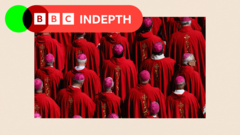The Vatican's Santa Marta guesthouse, home to 128 rooms, is gearing up for the arrival of cardinals who will convene from May 7 to elect the next Pope following the death of Pope Francis. One room remains sealed with a red ribbon, a poignant symbol of the late pontiff's significant legacy. With Pope Francis having served for 12 years and influential in appointing approximately 80% of the cardinals participating in this conclave, his impact looms large over these critical discussions.
In the days leading up to this significant election, a consensus appears to be forming among many cardinals regarding the importance of building on Pope Francis's reforms. However, dissenting voices still raise concerns over the future direction of the Church, raising the question of whether those critical of his leadership will manage to influence the outcome of the vote, particularly as they navigate the Church's varying perspectives globally.
This conclave is characterized by unprecedented diversity, with cardinals representing countries such as South Sudan, Papua New Guinea, and Rwanda for the first time. During pre-conclave meetings, these cardinals have highlighted divergent priorities depending on their local contexts: European cardinals may focus on revitalizing a dwindling church attendance, while their counterparts from Africa or Asia often cite urgent social issues like poverty and conflict resolution.
The role of the Pope entails various responsibilities: spiritual leader, global influencer, and leader of the Vatican City State, a small entity with an outsized global presence. Pope Francis amplified the Vatican’s influence by advocating for marginalized communities and attempted to mediate international conflicts. His efforts drew a broad global interest that extended beyond Catholic believers, highlighting his universal appeal as a voice for justice, anti-war efforts, and environmental concerns.
Despite Pope Francis’s efforts to modernize the Church’s approach to sexuality, governance, and community engagement, many cardinals remain uncertain about the path forward. His commitment to redistributing power towards the lay community, particularly regarding women's participation and acceptance of LGBTQ+ members, has faced scrutiny and calls for a more concrete strategy.
Traditionalists within the Church have voiced their opposition to Francis's vision, suggesting that it diverges from long-standing Church doctrines. Some prominent figures, such as Cardinal Beniamino Stella, openly criticized the late Pope for his perceived imposition of progressive ideas. Meanwhile, sentiments expressed at his funeral, with applause for themes like dignity for migrants and conflict resolution, indicate a yearning for continuity in addressing these crucial issues.
The internal debates among cardinals reflect a broader divide over how the Church should respond to contemporary challenges, emphasizing a desire for clarity and unity. As the conclave approaches, one recurring theme is the need for a new pope who can bridge gaps between differing factions while maintaining continuity with the impactful elements of Francis's papacy. The transition from the legacy of Pope Francis introduces both challenges and opportunities for redefining the universal mission of the Catholic Church in a rapidly changing world.
In the days leading up to this significant election, a consensus appears to be forming among many cardinals regarding the importance of building on Pope Francis's reforms. However, dissenting voices still raise concerns over the future direction of the Church, raising the question of whether those critical of his leadership will manage to influence the outcome of the vote, particularly as they navigate the Church's varying perspectives globally.
This conclave is characterized by unprecedented diversity, with cardinals representing countries such as South Sudan, Papua New Guinea, and Rwanda for the first time. During pre-conclave meetings, these cardinals have highlighted divergent priorities depending on their local contexts: European cardinals may focus on revitalizing a dwindling church attendance, while their counterparts from Africa or Asia often cite urgent social issues like poverty and conflict resolution.
The role of the Pope entails various responsibilities: spiritual leader, global influencer, and leader of the Vatican City State, a small entity with an outsized global presence. Pope Francis amplified the Vatican’s influence by advocating for marginalized communities and attempted to mediate international conflicts. His efforts drew a broad global interest that extended beyond Catholic believers, highlighting his universal appeal as a voice for justice, anti-war efforts, and environmental concerns.
Despite Pope Francis’s efforts to modernize the Church’s approach to sexuality, governance, and community engagement, many cardinals remain uncertain about the path forward. His commitment to redistributing power towards the lay community, particularly regarding women's participation and acceptance of LGBTQ+ members, has faced scrutiny and calls for a more concrete strategy.
Traditionalists within the Church have voiced their opposition to Francis's vision, suggesting that it diverges from long-standing Church doctrines. Some prominent figures, such as Cardinal Beniamino Stella, openly criticized the late Pope for his perceived imposition of progressive ideas. Meanwhile, sentiments expressed at his funeral, with applause for themes like dignity for migrants and conflict resolution, indicate a yearning for continuity in addressing these crucial issues.
The internal debates among cardinals reflect a broader divide over how the Church should respond to contemporary challenges, emphasizing a desire for clarity and unity. As the conclave approaches, one recurring theme is the need for a new pope who can bridge gaps between differing factions while maintaining continuity with the impactful elements of Francis's papacy. The transition from the legacy of Pope Francis introduces both challenges and opportunities for redefining the universal mission of the Catholic Church in a rapidly changing world.





















